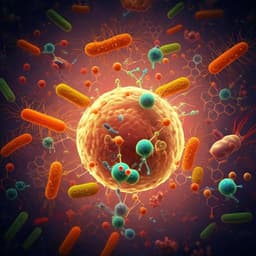
Medicine and Health
Abiraterone acetate preferentially enriches for the gut commensal *Akkermansia muciniphila* in castrate-resistant prostate cancer patients
B. A. Daisley, R. M. Chanyi, et al.
This groundbreaking research reveals how Abiraterone acetate not only inhibits androgen biosynthesis in prostate cancer but also reshapes the gut microbiome by enriching beneficial bacteria. Conducted by a team including Brendan A. Daisley and Ryan M. Chanyi, the study highlights the potential of combining cancer therapies with targeted microbial enhancements for improved treatment outcomes.
~3 min • Beginner • English
Introduction
The study investigates how gastrointestinal microbiota interact with prostate cancer therapies, particularly androgen deprivation therapy (ADT) and the orally administered androgen receptor-axis drug abiraterone acetate (AA). Prostate cancer progression depends on androgen receptor signaling, yet disease may progress despite castrate androgen levels (castrate-resistant PC), for which AA is a standard oral therapy. AA is poorly absorbed and substantially excreted in feces, exposing gut microbiota to high AA concentrations and suggesting potential microbiota-mediated biotransformation. Given known links between serum sex steroid hormone levels and gut microbiota composition, the authors hypothesized that systemic androgen depletion via ADT would alter colonization by androgen-utilizing bacteria, and that oral AA would directly remodel gut microbial communities, potentially affecting treatment outcomes.
Literature Review
Recent reports link the human microbiome to cancer development, progression, and treatment efficacy. Akkermansia muciniphila is associated with favorable responses to anti-PD-1 immunotherapy and inversely correlated with inflammation, obesity, and metabolic disorders. The GI microbiota’s influence on distant malignancies like prostate cancer is less understood. Prior studies show associations between sex steroid hormones and gut microbiota, and substantial evidence exists for microbiota-mediated xenobiotic metabolism (e.g., irinotecan, NSAIDs, digoxin, metformin). A smaller previous study (n=30) reported increased A. muciniphila in patients on oral androgen receptor-targeted therapies (AA, bicalutamide, enzalutamide) but did not distinguish drug-specific effects or dissect host versus direct microbial mechanisms.
Methodology
Design and cohorts: Rectal swab fecal samples were collected from 68 prostate cancer patients after routine digital rectal examination. Three groups were studied: no active treatment (control, n=33), ADT (n=21), and ADT plus oral AA (ADT+AA, n=14). Clinical metadata included age, BMI, recent antibiotics, bicalutamide, metformin, oral steroid use, PSA, pelvic radiation, and metastatic status. Ethics approval was obtained and informed consent collected. 16S rRNA gene sequencing: DNA was extracted using Qiagen DNeasy PowerSoil HTP 96 kit. The V4 region was amplified with Golay-barcoded primers and sequenced on Illumina MiSeq (2×250 bp). DADA2 pipeline inferred exact ASVs; SILVA v132 used for taxonomy; contaminants removed with decontam; outliers identified with CoDaSeq. Diversity and differential abundance: Zero replacement (zCompositions CZM), minimum abundance 1%, clr transformation, Aitchison distances for PCA. Alpha diversity (Shannon’s H) and beta diversity (Aitchison) computed in QIIME2; Kruskal–Wallis/Dunn’s tests applied. Differential taxa assessed with ALDEx2 (Wilcoxon with BH FDR), effect sizes reported. Metadata-microbiota associations: envfit (vegan) used for multivariate ANOVA/correlations (999 permutations, FDR <5%); MaAsLin2 used for multivariate genus-covariate associations (clr input, 1% min abundance, BH FDR). In vitro fecal incubations: Fresh fecal inocula from 8 non-treated donors cultured anaerobically in BHI with AA (100 µg/mL) or vehicle (EtOH) at 37 °C for up to 48 h; 16S sequencing performed; paired Wilcoxon tests with BH FDR for diversity; ALDEx2 for differential abundances. Simulated human distal gut model: A 4 L Bioflo 110 chemostat was inoculated with feces from a healthy donor and stabilized for 14 days (anaerobic N2, pH 6.8, defined medium). AA exposure consisted of 250 mg AA/day (dissolved in ethanol) administered for six consecutive days, followed by washout. Effluent was collected before, during, and after exposure for 16S sequencing and qPCR (total bacteria, Enterobacteriaceae, A. muciniphila). Co-occurrence networks: CoNet with ensemble metrics (Pearson, Spearman, Bray–Curtis, KL divergence, mutual information), permutations and bootstraps with BH FDR; visualized in Cytoscape. Functional inference: PICRUSt2 on ASVs placed via QIIME2 fragment insertion; NSTI < 2.0 for all ASVs. EC numbers normalized to 16S rRNA copies, regrouped to MetaCyc RXNs, and pathways inferred (MetaCyc). LEfSe used with subclass analysis to distinguish AA effects from ADT (LDA >2, p < 0.05), and ALDEx2 for effect sizes. Bacterial growth and AA metabolism: Pure cultures of A. muciniphila DSM 22959 and 17 additional strains (largely Enterobacteriaceae) were grown with AA or sodium acetate. Growth medium included BHIS-YE with supplements for A. muciniphila; other strains grown microaerophilically. Growth assays used 0.25 mM AA or equimolar sodium acetate; OD600 monitored; growthcurver used to estimate metrics (e.g., carrying capacity k). AA degradation quantified by HPLC (100 ppm AA), with protein crash, C18 column, 80:20 acetonitrile:water, 1.2 mL/min, 254 nm detection, ~8 min retention. Acetate utilization by isolates assessed qualitatively on selective agar and quantitatively in M9 minimal medium with AA or acetate.
Key Findings
- Patient microbiota structure: PCA of clr/Aitchison distances showed distinct clustering by treatment; ADT and ADT+AA shifted from controls along PC1 and from each other along PC2 (20.4% and 15.7% variability explained, respectively). Shannon diversity was significantly lower in ADT+AA versus controls. Among 17 metadata variables, only AA (p=0.001), ADT (p=0.043), and corticosteroids (p=0.049) significantly associated with microbiota composition.
- Androgen-utilizing taxa reduced with ADT: Corynebacterium relative abundance decreased in ADT and ADT+AA compared with controls (controls 95% CI 0.097–0.509%; ADT 0.001–0.064%; ADT+AA 0.001–0.099%). Other steroid-metabolizing Actinobacteria genera also trended lower. In vitro, abiraterone (not acetate alone) inhibited several human-derived Corynebacterium spp.
- AA enriches Akkermansia muciniphila: A. muciniphila was significantly higher in ADT+AA (95% CI 0.094–2.436%) versus ADT (0.031–0.304%) and controls (0.035–0.565%). In vitro fecal incubations with AA reduced beta diversity only when baseline A. muciniphila ≥0.1% and increased Akkermansia abundance (ALDEx2: ***p=0.0005; other comparisons *p=0.0358 or n.s.).
- Host-free gut model reproduces AA effects: In the chemostat, AA exposure caused >130-fold rise in A. muciniphila within 24 h, peaking at >1000-fold, then declining after withdrawal. After adjusting for time, AA exposure enriched Akkermansia, Klebsiella, Bilophila, Hungatella, and Oscillibacter, and depleted Faecalibacterium, Coprococcus, and unclassified Lachnospiraceae ND3007. Co-occurrence analysis showed strong positive association of AA with Akkermansia and negative associations with butyrate producers.
- Bacterial metabolism of AA and selective growth: HPLC showed ~70% of AA was degraded after 24 h by all tested strains. Only A. muciniphila gained a direct growth advantage from AA in mixed-carbon media; others had no benefit or reduced growth. Equimolar sodium acetate reproduced the growth enhancement in A. muciniphila, implicating the acetate moiety.
- Functional shifts toward acetate utilization and vitamin K2: PICRUSt2 predicted increased glyoxylate bypass and multiple menaquinone (vitamin K2; MK7, MK8, MK11–MK13) biosynthesis pathways in AA-exposed samples (patients and gut model), while ubiquinol and assorted nucleotide/amino acid pathways also varied. Time-series overlays showed tight correlation between A. muciniphila abundance and MK7/8/11/12/13 pathways; Enterobacteriaceae correlated with MK6/9/10. Stratified pathway contributions indicated Bacteroidales as dominant contributors overall, with Enterobacteriales and Verrucomicrobiales (A. muciniphila) disproportionately contributing to MK6–MK13 in ADT+AA patients. Mycolic acid biosynthesis pathways were nearly undetectable in ADT and ADT+AA versus controls.
Discussion
Findings demonstrate that oral abiraterone acetate directly and reproducibly remodels gut microbial communities, primarily by enriching Akkermansia muciniphila. Systemic ADT coincides with depletion of androgen-utilizing Corynebacterium and related Actinobacteria, consistent with reduced androgen availability and potential direct abiraterone inhibition of steroid-metabolizing bacteria. The preferential expansion of A. muciniphila appears to be driven by the acetate moiety of AA, with support from growth assays and predicted upregulation of the glyoxylate cycle enabling growth on acetate. In a host-free gut model, Akkermansia blooms preceded increases in Enterobacteriaceae, suggesting cross-feeding and quinone-mediated syntrophy. Functional inference indicates increased microbial menaquinone (vitamin K2) biosynthesis, with Akkermansia and Enterobacteriaceae contributing homolog-specific MK pathways. Given vitamin K2’s roles in host physiology and reported anti-tumor activities in prostate cancer models, enhanced microbial K2 production may represent an auxiliary mechanism by which AA benefits castrate-resistant patients. The observed reduction of mycolic acid biosynthesis (typical of Corynebacterium) and associations with inflammation further underscore potential therapeutic relevance. Overall, the data support a model where AA’s poor absorption yields high colonic exposure, fostering Akkermansia growth, acetate utilization, and community restructuring that could modulate treatment responses.
Conclusion
This work identifies Akkermansia muciniphila as a key mediator of gut microbiota restructuring in response to abiraterone acetate and suggests that AA’s clinical efficacy may be partly supported by increased microbial vitamin K2 biosynthesis and acetate-driven metabolic shifts. The results are consistent across patient samples, in vitro fecal incubations, and a host-free gut model, pointing to a direct microbiota–xenobiotic interaction. These insights highlight potential strategies to enhance therapy, including targeted colonic delivery of acetate-like substrates, supplementation or enrichment of A. muciniphila, and modulation of quinone pools. Future research should include longitudinal interventional trials evaluating A. muciniphila and vitamin K2 adjuncts with AA, mechanistic dissection of cross-feeding and quinone dependency, and detailed assessment of AA’s direct effects on steroid-metabolizing bacteria.
Limitations
Predicted functional profiles were inferred from 16S rRNA gene data (PICRUSt2) rather than shotgun metagenomics, which may limit pathway resolution and accuracy despite acceptable NSTI scores. The clinical cohort was cross-sectional with modest group sizes (particularly ADT+AA, n=14), limiting causal inference. Corticosteroid co-medication was associated with microbiota variation and overlapped with ADT regimens. The chemostat and in vitro assays, while excluding host immune effects and confirming direct drug–microbe interactions, cannot fully recapitulate in vivo physiology. Some associations (e.g., vitamin K2 effects on host and tumors) remain correlative and require validation in longitudinal and interventional studies.
Related Publications
Explore these studies to deepen your understanding of the subject.







